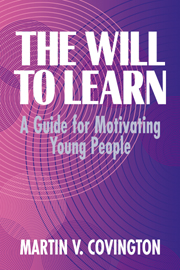Book contents
- Frontmatter
- Contents
- 1 The Future and Its Discontents
- 2 Motives as Emotions
- 3 Motives as Thoughts
- 4 Self-Worth and the Fear of Failure
- 5 The Competitive Learning Game
- 6 Motivational Equity and the Will to Learn
- 7 Strategic Thinking and the Will to Learn
- 8 An Immodest Proposal
- 9 Obstacles to Change: The Myths of Competition
- Epilogue
- Appendixes
- References
- Author Index
- Subject Index
Appendixes
Published online by Cambridge University Press: 31 January 2011
- Frontmatter
- Contents
- 1 The Future and Its Discontents
- 2 Motives as Emotions
- 3 Motives as Thoughts
- 4 Self-Worth and the Fear of Failure
- 5 The Competitive Learning Game
- 6 Motivational Equity and the Will to Learn
- 7 Strategic Thinking and the Will to Learn
- 8 An Immodest Proposal
- 9 Obstacles to Change: The Myths of Competition
- Epilogue
- Appendixes
- References
- Author Index
- Subject Index
Summary
APPENDIX A
Someone is washing, folding, and storing laundry! All good theories, including this one, explain otherwise puzzling events and draw them together into a meaningful whole. Seen from this perspective, there is nothing more practical than a good theory. For instance, as you will soon see, the self-worth theory of achievement motivation will help explain the following classroom puzzles:
Why is it that when teachers reward student effort by giving credit for studying hard, many youngsters remain unmotivated?
Why, when students do study, some of them hide their efforts or are reluctant to admit that they study at all?
Why is it that for some students, getting high grades does not necessarily lead to a sense of pride and personal satisfaction?
Why is it that for some students who have always done well in school, it takes only one failure to jeopardize their sense of worth and confidence?
These and other similar puzzles must be solved before effective school reform can be fully realized. Theories, such as the self-worth theory and the attribution theory, provide the blueprints for these solutions.
- Type
- Chapter
- Information
- The Will to LearnA Guide for Motivating Young People, pp. 261 - 275Publisher: Cambridge University PressPrint publication year: 1997



